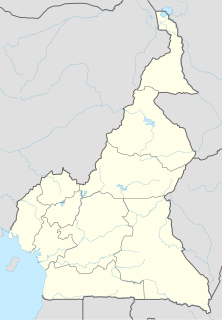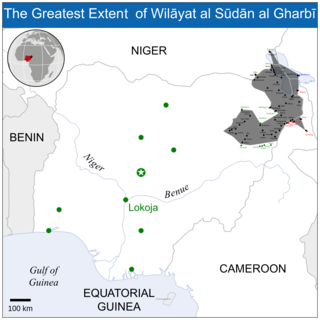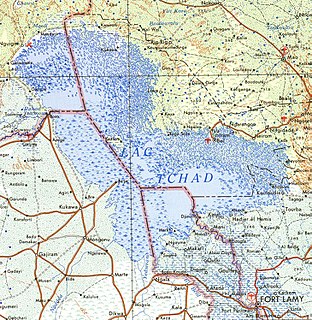
Maiduguri is the capital and the largest city of Borno State in north-eastern Nigeria. The city sits along the seasonal Ngadda River which disappears into the Firki swamps in the areas around Lake Chad. Maiduguri was founded in 1907 as a military outpost by the British and has since grown rapidly with a population exceeding a million by 2007.

Operation Juniper Shield, formerly known as Operation Enduring Freedom – Trans Sahara (OEF-TS), is the military operation conducted by the United States and partner nations in the Sahara/Sahel region of Africa, consisting of counterterrorism efforts and policing of arms and drug trafficking across central Africa. It is part of the Global War on Terrorism (GWOT). The other OEF mission in Africa is Operation Enduring Freedom – Horn of Africa (OEF-HOA).

Boko Haram, officially known as Jamā'at Ahl as-Sunnah lid-Da'wah wa'l-Jihād, and Wilāyat Garb Ifrīqīyā, meaning "West African Province", is a terrorist organization based in northeastern Nigeria, which is also active in Chad, Niger and northern Cameroon.

This article details the foreign relations between Cameroon and Nigeria.
Fotokol is a town and commune in Logone-et-Chari Department, Far North Region, Cameroon. It is home to Fotokol High School.

The Boko Haram insurgency began in July 2009, when the jihadist group Boko Haram started an armed rebellion against the government of Nigeria. The conflict takes place within the context of long-standing issues of religious violence between Nigeria's Muslim and Christian communities, and the insurgents' ultimate aim is to establish an Islamic state in the region.
Timeline of the Boko Haram insurgency is the chronology of the Boko Haram insurgency, an ongoing armed conflict between Nigerian Islamist group Boko Haram and the Nigerian government. Boko Haram have carried out many attacks against the military, police and civilians since 2009, mostly in Nigeria. The low-intensity conflict peaked in the mid 2010s, when Boko Haram extended their insurgency into Cameroon, Chad and Niger.

On the night of 14–15 April 2014, 276 mostly Christian female students aged from 16 to 18 were kidnapped by the Islamic terrorist group Boko Haram from the Government Girls Secondary School at the town of Chibok in Borno State, Nigeria. Prior to the raid the school had been closed for four weeks due to deteriorating security conditions, but the girls were in attendance in order to take final exams in physics.

Amchide is a town in Cameroon, on the border with Nigeria. It abuts the Nigerian town of Banki, with streets and even houses straddling the border.
The Abuja DSS attack was a coordinated terrorist attack by the Islamic group Boko Haram on the Department of State Security, Abuja on 31 March 2014 in a bid to escape from detention. This resulted in the death of 21 insurgents who attempted to escape leaving 2 security personnel severely injured.
The December 2014 Cameroon clashes were a number of incidents that occurred between 28–29 December 2014 in variety of locations in Cameroon's Far North Region. The event included attacks on civilians and military positions carried out by Nigeria-based Boko Haram; the attacks were followed by a successful Cameroonian military counter offensive.

The Multinational Joint Task Force (MNJTF) is a combined multinational formation, comprising units, mostly military, from Benin, Cameroon, Chad, Niger, and Nigeria. It is headquartered in N'Djamena and is mandated to bring an end to the Boko Haram insurgency.
The January 2015 raid on Kolofata was an unsuccessful assault on a Cameroonian military base at Kolofata, Far North Region, perpetrated by Boko Haram. The incident occurred on 12 January 2015 coming shortly after another Boko Haram incursion onto Cameroonian soil.

Starting in late January 2015, a coalition of West African troops launched an offensive against the Boko Haram insurgents in Nigeria.

Giwa barracks is a military detention center located in northeastern Nigeria, near the city of Maiduguri. Since 2014, the facility has been attacked multiple times by Boko Haram, as prisoners in the facility are mostly confirmed or suspected members of Boko Haram and their families. In 2016, the prison held an estimated 1,200 prisoners. Human rights groups such as Amnesty International have accused the Nigerian military of mistreating and torturing prisoners, as well as running the facility "inhumanely".
Salak is a village in the Far North Region of Cameroon, near the Salak Airport.

The Chad Basin campaign of 2018–2020 was a series of battles and offensives in the southern Chad Basin, particularly northeastern Nigeria, which took place amid the ongoing Boko Haram insurgency. The Chad Basin witnessed an upsurge of insurgent activity from early November 2018, as rebels belonging to the Islamic State's West Africa Province (ISWAP) and Boko Haram launched offensives and several raids to regain military strength and seize territory in a renewed attempt to establish an Islamic state in the region. These attacks, especially those by ISWAP, met with considerable success and resulted in the displacement of hundreds of thousands of civilians. The member states of the Multinational Joint Task Force (MJTF), namely Nigeria, Niger, Chad, and Cameroon responded to the increased insurgent activity with counter-offensives. These operations repulsed the rebels in many areas, but failed to fully contain the insurgency.

From 2018, the Anglophone Crisis drew increasing international attention, and became a challenge to Cameroon's foreign relations. Triggered by a violent crackdown on the 2016–2017 Cameroonian protests, the conflict escalated from a low-scale insurgency to a civil war-like situation. While Cameroon enjoys support from African countries, no country has openly supported the Ambazonian independence movements. However, many countries have put pressure on Cameroon to talk to the separatists. In addition, the separatists enjoy support from officers in the Nigerian Army, who have helped arrange arms deals for them.
Brig. Gen. Valere Nka is a Cameroonian general who has commanded Cameroonian soldiers in the Boko Haram insurgency and the Anglophone Crisis. He has also served as Defence Attaché to Nigeria.












